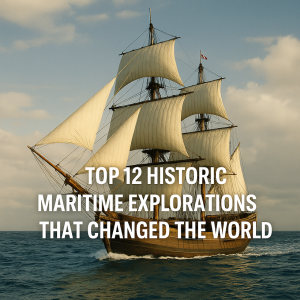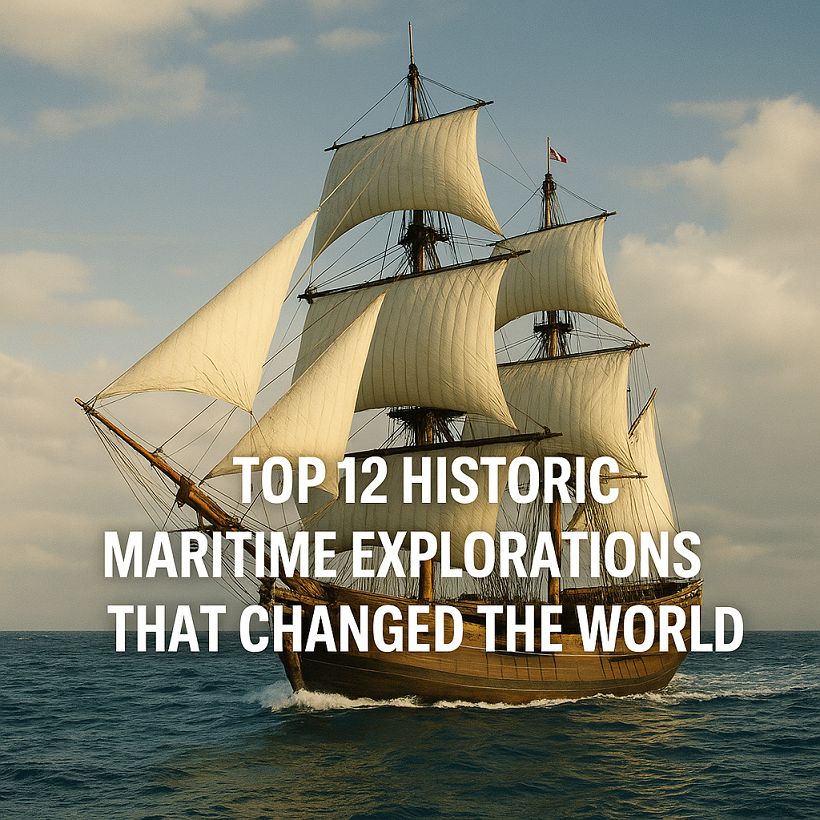
Discover the top 12 historic maritime explorations that reshaped world history. From Magellan’s circumnavigation to Zheng He’s treasure voyages, explore how seafaring adventures transformed global trade, science, and culture.
Why Maritime Exploration Still Matters
If you look at a modern container ship gliding across the ocean, it’s easy to forget that only a few centuries ago, the sea was a mystery filled with dangers, myths, and endless curiosity. The oceans that now carry 90% of world trade (UNCTAD, 2023) were once considered the edge of the world, where sea monsters lurked and no one knew what lay beyond the horizon.
Yet, brave navigators, merchants, and explorers challenged those fears. Their voyages were not just about new lands but about expanding the boundaries of human knowledge. From Zheng He’s treasure fleets that connected China with Africa, to Magellan’s circumnavigation that proved the world was round, maritime explorations created the global networks we now take for granted. These historic journeys were the space missions of their time—high-risk, high-reward, and transformational for humanity. This article explores the 12 most influential maritime explorations in history, why they mattered, and how they continue to influence our world today.
Why Maritime Explorations Changed the World
Maritime exploration was never just about adventure; it fundamentally reshaped the world. It altered global geopolitics and everyday life by creating new flows of trade and wealth, as precious commodities like spices, silk, and silver moved across oceans and built empires. These voyages redrew the map of the world, advanced scientific knowledge through improved navigation and charting, and facilitated a vast exchange of languages, religions, and ideas. This period also had a profound dark side, fueling colonialism, conflict, exploitation, and slavery. Ultimately, the daring voyages of exploration laid the direct foundation for our modern, interconnected global economy. In short:
- Trade and Wealth: Spices, silk, silver, and gold flowed across oceans, shaping empires.
- Geography and Science: Maps were redrawn, new continents charted, and astronomical navigation developed.
- Cultural Exchange: Languages, religions, and ideas traveled with sailors and merchants.
- Colonialism and Conflict: Exploration also fueled conquest, exploitation, and slavery.
- Modern Globalization: Today’s interconnected world economy has roots in these daring voyages.
–
The Top 12 Historic Maritime Explorations
1. The Phoenician Voyages (c. 1200–500 BCE)
Long before Columbus, the Phoenicians of the Mediterranean mastered shipbuilding and navigation.
-
Why it mattered: They developed advanced galleys, spread the alphabet, and established trade routes across the Mediterranean and possibly beyond Gibraltar.
-
Legacy: The Phoenicians are often called the “first global traders.” Their maritime networks inspired later Greek and Roman seafaring.
2. The Viking Voyages to North America (c. 1000 CE)
The Norse explorers were fearless. Around 1000 CE, Leif Erikson sailed from Greenland to what is now Newfoundland, Canada.
-
Why it mattered: They reached North America centuries before Columbus.
-
Archaeological proof: The site of L’Anse aux Meadows (UNESCO World Heritage) shows Viking presence in North America.
-
Legacy: While their settlements were short-lived, the Vikings proved transatlantic voyages were possible.
3. Zheng He’s Treasure Voyages (1405–1433)
Under the Ming Dynasty, Admiral Zheng He commanded fleets of massive treasure ships that dwarfed European caravels.
-
Scope: He visited Southeast Asia, India, the Middle East, and East Africa.
-
Ships: Some were estimated at over 120 meters long, carrying thousands of sailors.
-
Legacy: China projected its power peacefully through diplomacy and trade. Some historians argue that if China had continued, the Age of Exploration might have been led from the East.
4. Christopher Columbus’ First Voyage (1492)
Perhaps the most famous voyage in history, Columbus sailed west under Spain, seeking a shortcut to Asia but instead encountering the Americas.
-
Why it mattered: His journey opened sustained contact between Europe and the Americas, changing history forever.
-
Consequences: This led to colonization, transatlantic trade, and also devastating impacts on indigenous populations.
-
Legacy: The “Columbian Exchange” transformed diets, economies, and environments worldwide.
5. Vasco da Gama’s Route to India (1497–1499)
Portuguese navigator Vasco da Gama became the first European to reach India by sea, rounding the Cape of Good Hope.
-
Why it mattered: His voyage linked Europe and Asia directly by ocean, bypassing costly land routes controlled by Middle Eastern powers.
-
Economic impact: This transformed global trade, launching the spice trade and Portuguese dominance in the Indian Ocean.
6. Ferdinand Magellan’s Circumnavigation (1519–1522)
Magellan set out to sail westward around the globe. Though he died in the Philippines, his expedition completed the first circumnavigation of Earth.
-
Why it mattered: Proved the world was round and oceans interconnected.
-
Challenges: The journey took three years; only 18 of 270 crew survived.
-
Legacy: It remains one of the greatest achievements in maritime history.
7. Sir Francis Drake’s Circumnavigation (1577–1580)
Nearly 60 years after Magellan, Francis Drake became the first Englishman to circumnavigate the globe.
-
Why it mattered: Strengthened England’s naval reputation and challenged Spanish dominance.
-
Legacy: His voyage was a mix of exploration and piracy, shaping England’s maritime empire.
8. The Dutch East India Company Voyages (1600s)
The VOC (Vereenigde Oostindische Compagnie) was not a single voyage but a fleet of expeditions that established Dutch power in Asia.
-
Why it mattered: It was the world’s first multinational corporation, pioneering modern capitalism.
-
Impact: Dutch explorers like Abel Tasman mapped Australia, New Zealand, and parts of the Pacific.
9. James Cook’s Pacific Voyages (1768–1779)
Captain James Cook led three major expeditions across the Pacific.
-
Achievements: He mapped New Zealand, the east coast of Australia, and numerous Pacific islands.
-
Science: His expeditions carried naturalists like Joseph Banks, contributing to botany, anthropology, and astronomy.
-
Legacy: Cook’s voyages advanced science but also paved the way for British colonization.
10. The Lewis and Clark Expedition by River and Sea (1804–1806)
Though primarily overland, Lewis and Clark’s Corps of Discovery also relied on river navigation and maritime supply.
-
Why it mattered: Opened up the American West and expanded U.S. geographical knowledge.
-
Maritime angle: Supported by naval vessels, showing how sea power enabled inland exploration.
11. Charles Darwin on HMS Beagle (1831–1836)
Darwin’s five-year voyage on HMS Beagle changed science forever.
-
Discoveries: Observations in the Galápagos Islands inspired his theory of natural selection.
-
Legacy: His maritime journey reshaped biology and our understanding of life on Earth.
12. The Challenger Expedition (1872–1876)
The HMS Challenger expedition is often called the birth of modern oceanography.
-
Scope: Circumnavigated the globe, taking deep-sea soundings, water samples, and marine life observations.
-
Achievements: Discovered over 4,000 new species and the Mariana Trench.
-
Legacy: Established oceanography as a scientific discipline and remains a model for marine research.
–
Case Studies: Lessons from Exploration
-
Magellan’s Expedition proved the Earth’s interconnected oceans, influencing navigation laws and global trade routes still used today.
-
Zheng He’s Voyages showed maritime diplomacy as an alternative to conquest. Modern initiatives like China’s Belt and Road are often compared to them.
-
The Challenger Expedition laid foundations for IMO and UNESCO’s later marine science frameworks, influencing how we manage today’s oceans.
Challenges Faced by Early Explorers
-
Navigation tools: Before GPS, sailors relied on the stars, the astrolabe, and dead reckoning.
-
Disease: Scurvy killed thousands; vitamin C was unknown until the 18th century.
-
Political rivalry: Explorations were often fueled by empire-building, leading to conflict.
-
Survival risks: Shipwrecks, storms, and mutinies were constant threats.
Exploration was as much about human endurance as about technology.
Modern Lessons from Historic Explorations
-
Collaboration across cultures: Just as early voyages exchanged ideas, today’s shipping depends on multinational crews and IMO regulations.
-
Sustainability: Unlike resource-hungry colonial explorers, modern maritime policy (e.g., IMO GHG Strategy, 2023) emphasizes environmental protection.
-
Innovation: Early explorers invented tools for survival; today, shipping companies innovate with digital twins, LNG, and carbon capture.
FAQ: Maritime Exploration
1. Who was the greatest maritime explorer of all time?
Historians debate, but Magellan’s circumnavigation is often considered the most significant.
2. Did the Vikings really reach America first?
Yes. Archaeology confirms Norse settlements in Newfoundland around 1000 CE.
3. Why did China stop Zheng He’s voyages?
Political shifts in the Ming Dynasty prioritized internal stability over costly expeditions.
4. How did explorers navigate without modern tools?
They used stars, compasses, and rudimentary maps. Accuracy was limited but improved over centuries.
5. What was the biggest scientific impact of maritime exploration?
Darwin’s Beagle voyage and the Challenger expedition revolutionized biology and oceanography.
6. Are modern maritime explorations still happening?
Yes. Deep-sea missions, Arctic routes, and oceanographic research continue the tradition of discovery.
Conclusion: Oceans as Pathways of Human Destiny
From Phoenician traders to Darwin’s Beagle, the history of maritime exploration is the history of human curiosity. These 12 voyages changed maps, economies, and even our understanding of life itself.
Today, when ships equipped with satellites and AI sail across the same waters, they are part of a story that began with explorers daring to leave sight of land. The sea remains both a challenge and a promise.
So, whether you are a maritime student, a professional, or simply a dreamer gazing at the horizon, remember: the ocean is not a barrier—it is a bridge that has always connected humanity. 🌊
References
-
UNCTAD. (2023). Review of Maritime Transport. Link
-
International Maritime Organization (IMO). (2023). GHG Strategy. Link
-
Bergreen, L. (2004). Over the Edge of the World: Magellan’s Terrifying Circumnavigation of the Globe.
-
Paine, L. (2013). The Sea and Civilization: A Maritime History of the World.
-
National Geographic. (2020). Historic Voyages and Discoveries.
-
UNESCO. (2021). World Heritage: L’Anse aux Meadows.
-
Darwin, C. (1859). On the Origin of Species.
-
RINA Journal. (2022). Maritime Explorations and Ocean Science.

